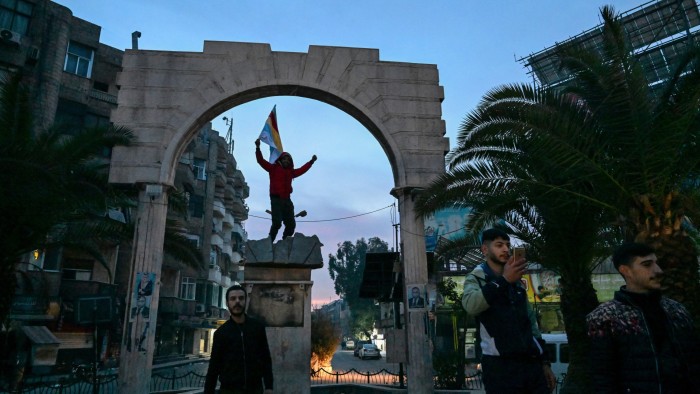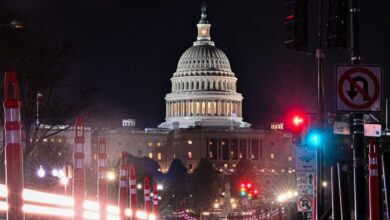Syrian rebels entered Damascus and claimed to have overthrown Assad

Syrian rebels said they advanced on Damascus on Sunday as President Bashar al-Assad’s regime appeared to collapse in the face of a terrifying onslaught by rebels across the country.
The rebels said in a statement that “the city of Damascus is no longer under the rule of tyrant Bashar al-Assad” and that “Assad has fled” after various factions besieged the capital from the north and south. male.
It is unclear where Assad is, with reports suggesting he has fled, which would bring an ignominious end to a family dynasty that has ruled Syria for more than 50 years.
Residents said there was celebratory gunfire in the air, with clouds of smoke drifting across the capital.
“I can’t believe it. Everyone poured into the streets, everyone screamed,” said Abdallah, a Damascus resident. “It’s something historic. No one has suffered as much as the Syrian people.”
He added that rebel fighters were posted outside banks and other public institutions to protect them.
The fall of the Assad regime will usher in a period of great instability for Syria, a country broken and divided after 13 years of civil war, as well as for the wider region. The country shares borders with Israel, Jordan, Iraq and Lebanon. Rebel groups have clashed with each other in the past.
The White House said President Joe Biden is “closely monitoring unusual events in Syria and regularly staying in contact with partners in the region.”
The rebel attack was led by Hayat Tahrir al-Sham, an Islamic movement was confined to Syria’s northwestern Idlib province before the start of the offensive 12 days ago. The group, once an al-Qaeda affiliate, rocked the country by seizing Aleppo, Syria’s second city, for 48 hours and then marching south toward the capital.
They have cooperated with Turkish-backed rebels operating under the auspices of the Syrian National Army, but Syria is home to countless factions and the level of coordination between all these factions is unknown. clear.
There have been no official statements by the Syrian president, the military or state media on Assad or the situation in the country. Al-Ekhbaria, a state television channel, is broadcasting pre-recorded footage of Syrian architecture set to soft guitar music.
Assad, a London-trained ophthalmologist, has ruled Syria since 2000, when he succeeded his late father Hafez al-Assad. The civil war broke out in 2011 after his forces sought to brutally suppress a popular uprising.
He has tried to cling to power with the backing of Iran, Iranian-backed militants and Russia, which provides vital air power. His regime has regained control of most of the country in recent years.
But he has led a hollow, bankrupt state, and even many in his Alawite community appear to have abandoned the regime after years of conflict and economic hardship.
When HTS launched its attack on November 27, the regime’s forces seemed to vanish, while Russia, Iran and Hizbollah, the Lebanese militant movement, were all weakened and distracted by the conflicts their own.
Rebels said they gained full control of the strategic city of Homs, the last major city on the southern highway to Damascus, at dawn on Sunday.
Southern rebels, separated from HTS, took over Deraa, the birthplace of Syria’s 2011 uprising, as well as the cities of Suwaida and Quneitra, over the weekend, encircling Damascus from the south.
The rebels’ success is a humiliating blow for Iran, which is believed to have withdrawn its people from Syria, and for Russia. Moscow gained access to air and naval bases in the Mediterranean after intervening in the 2015 war.
Russian Foreign Minister Sergei Lavrov said on Saturday that Moscow would stand by its ally and was “trying to do everything not to allow terrorists to prevail, even if they say they are no longer terrorists.” terrorist too”.
Meanwhile, Tehran’s support for Assad has given the country a “land bridge” across Iraq to Syria and Lebanon, where its most important proxy force, Hizbollah, is located.
HTS is listed as a terrorist organization by the US, the United Nations, Türkiye and other powers, while the leader of this organization, Abu Mohammad al-Jolani, has a $10 million bounty on his head from the US. him.
In recent years, Jolani has sought to rebrand the group as a more moderate Islamist movement, building a centralized, autocratic movement with tight control in Idlib, home to 3-4 million people.
Rebels said they had freed prisoners from the notorious Sadnaya prison, which has become a symbol of the Assad regime’s brutal repression of political opponents.
On Saturday, Turkish President Recep Tayyip Erdoğan, who has long supported some opposition forces in Syria, hailed “a new political and diplomatic reality in Syria.”




